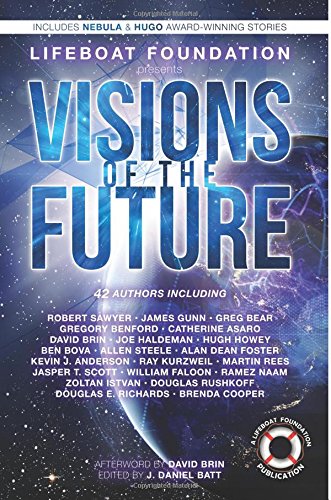good booksVisions of the Future
January 13, 2016
- author |
- J. Daniel Batt et al.
- year published |
- 2015
 Visions of the Future is a collection of stories and essays including Nebula and Hugo award-winning works. In this anthology, you’ll find stories and essays about artificial intelligence, androids, faster-than-light travel, and the extension of human life. You’ll read about the future of human institutions and culture.
Visions of the Future is a collection of stories and essays including Nebula and Hugo award-winning works. In this anthology, you’ll find stories and essays about artificial intelligence, androids, faster-than-light travel, and the extension of human life. You’ll read about the future of human institutions and culture.
But these literary works are more than just a reprisal of the classical elements of science fiction and futurism. At their core, each of these pieces has one consistent, repeated theme: us. You are in these pages.
Exploration of the future is not just pondering what’s out there or what’s to come. It is a discussion of how we as humans will react to what we encounter. How will we respond to androids, extraterrestrial life, and humans that have seemingly unlimited lifespan? How will we react to technologies that bridge colossal gaps of distance? We have not always met new technologies and philosophies with enthusiasm. Patterns of thought and belief that are thousands of years old still hold sway in shaping our reactions. What seemed to be obvious societal advances, in hindsight, were actually challenging battles.
If we encounter intelligent life amongst the stars, what will we do? Will our response be one of mutual curiosity and sharing? Or, instead, suspicion and fear?
This book, Visions of the Future, is not just a handy collection of pulp scifi adventures and articles. It continues a necessary conversation our society is having. Our responses now will shape our responses to come. If our relationship today with what is both new, unknown, and different is derived from fear, it’s not a far extrapolation to see that mentality carried forward. Hugh Howey’s “The Automated Ones” projects current fear-based bigotry into our relationship with AI life. Nicole Anderson’s “The Birth of the Dawn” shows a different relationship to human 2.0—one built on enthusiasm and wonder. The very challenges we face today will be mirrored in the future.
Science fiction has already begun to shape the way we think. Thomas M. Disch, in The Dreams Our Stuff Is Made Of, writes, “It is my contention that some of the most remarkable features of the present historical moment have their roots in a way of thinking that we have learned from science fiction.” Science fiction and futurism can be both predictive and prescriptive. Today’s TASER is an acronym for Thomas A. Swift’s Electric Rifle, referencing the pulp science fiction classic that gave inspiration to the modern-day inventor. Beyond technological foresight, science fiction functions as a lab for thought experiments. It allows us to imagine scenarios that are to come and then analyze them. Through the stories, we also analyze ourselves. We are reflecting back our own beliefs about humanity and our own fears.
The future isn’t predetermined. We are not guaranteed the stars. We are not guaranteed another century on this planet. We are not guaranteed this planet. Through resilience and incredible fortune, the future may turn out far more marvelous than even the stories in this book could imagine. But it will not just happen.
This is what this book in your hands is about: our relationship with our future. Will we be dragged into the future, kicking and screaming? Will we stumble into it? Will we flee back to the caves in fear of it? Or will we run to it? Create it? Design it?
This book is not a road map, but, hopefully, it can inspire the map makers. As you read these pages, keep in mind Dennis Cheatham’s words from The Power of Science Fiction: “It may be the case that the future worlds and infinite possibilities projected in science fiction can be used to inspire viewers to pursue work that will make those possibilities or ones like them, real.” It’s possible that one of the futures you’ll read in these pages might actually end up being right. But even the ones that will get it wrong (and let’s be honest, most science fiction does) are still critical for us now. It’s difficult to overstate the significance of the practice of science fiction on shaping us today. The most important aspect about explorations of the future is that they be written and be read.
So, enjoy reading. Find yourself in these pages. Discover our future in the words ahead.
— J. Daniel Batt, Editor
